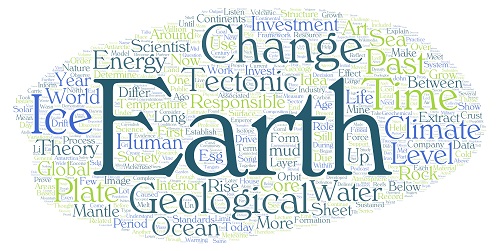Geoscientists and their research are as much part of the world, in all its messy complexity, as any other industry, writes Sarah Day
Day, S., What's geology got to do with it? Geoscientist 30 (1), 5, 2020
https://doi.org/doi: 10.1144/geosci2020-063, Download the pdf here
 The Society began its themed year project in 2015 with the gloriously named Year of Mud. ‘Mud represents both an ending and a beginning’, we proclaimed, and announced a year of ‘celebrating a resurgence of interest in that most common of materials’. Tasked as I was with generating media and public interest, I’ll admit I was a bit skeptical. But when the Year of Mud yielded an editorial in Nature, an interview on BBC World Service’s Science in Action and a mention – of all places - in the Independent’s gardening section, I had to admit there was something in it. Highlighting the relevance of our science to other disciplines, and to people’s lives, is the goal - and for whatever reason, mud had struck a chord.
The Society began its themed year project in 2015 with the gloriously named Year of Mud. ‘Mud represents both an ending and a beginning’, we proclaimed, and announced a year of ‘celebrating a resurgence of interest in that most common of materials’. Tasked as I was with generating media and public interest, I’ll admit I was a bit skeptical. But when the Year of Mud yielded an editorial in Nature, an interview on BBC World Service’s Science in Action and a mention – of all places - in the Independent’s gardening section, I had to admit there was something in it. Highlighting the relevance of our science to other disciplines, and to people’s lives, is the goal - and for whatever reason, mud had struck a chord.
Only now, four themed years on, do I realise mud was a fairly safe choice – every geologist, whether in industry, academia or out in the field, has in some way encountered the stuff. Subsequent themed years have branched out further. Eyebrows have been raised in some quarters for some themes not being ‘rocky’ enough – what does water, or risk for that matter, have to do with geology? 2020’s Year of Life will no doubt invite similar questions, but that’s just the point – what geology has to do with life, risk, finance (see this month’s Soapbox, p9) and a whole range of other subjects, and how we can communicate those connections, are exactly the questions we should be asking.
Science doesn’t happen in a vacuum – geoscientists and their research are as much part of the world, in all its messy complexity, as any other industry. The very public resignation of a Geological Society Fellow late last year (see Jonathan Cowie’s December online special for a reaction) over perceived connections between the Society and the oil and gas industry only highlights how complicated these questions can be. The Society, and the profession, must grapple with questions of sustainability and social responsibility as much as any other sector, but at the same time it cannot simply turn its back on an industry which has shaped our science – not to mention one in which many of its members are employed.
Geoscientist is primarily a science magazine, but increasingly many of our submissions – from feature articles to opinion pieces to short letters – are looking beyond the science, to questions like these. Our feature for this month focuses on diversity in the geosciences, and the question of whether it’s realistic, or even desirable, to separate your identity from your science. We will – of course – always welcome features focusing on science and research (my contact details are below!) but it seems fitting that these pages should be a forum for wider questions about the role geoscience plays in society as well.
Perhaps it’s time, given this trend, to reconsider the Society’s motto. ‘Whatever is under the Earth’ worked in 1807, but requires a bit of apologizing for these days. Now that Council has agreed that the programme of themed years will continue until at least 2025, I for one am hoping many more will prompt the question ‘what on Earth has geology got to do with it?’
SARAH DAY, EDITOR
[email protected]
@geowriter
@geoscientistmag